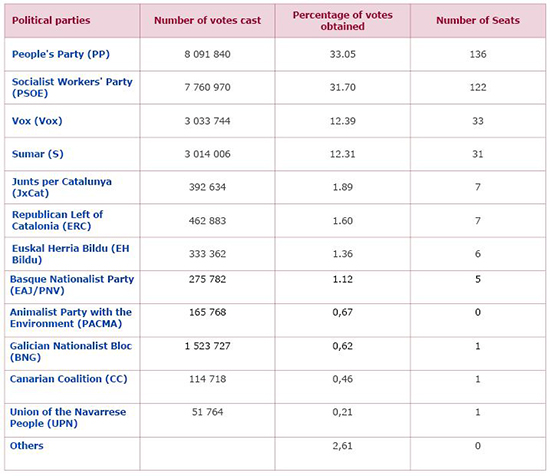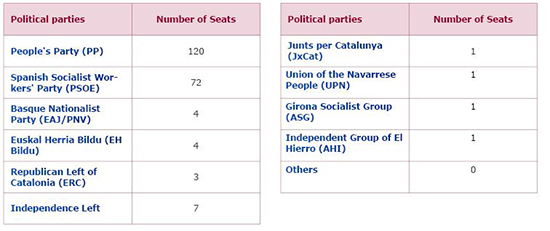Results
News
-

Available versions :
EN
The outgoing President of the government (Prime Minister), Pedro Sanchez (Socialist Workers' Party, PSOE), has partly succeeded in his gamble: although he did not win the parliamentary elections in Spain on 23 July, he nevertheless managed to ensure that the PSOE held on sufficiently to prevent the Popular Party (PP), the main right-wing opposition party, which came out on top in the elections, from obtaining a majority, including by allying itself with the populist right-wing party, Vox. Led by Alberto Nunez Feijoo, the PP won 33.05% of the vote and 136 seats (47 more than in the previous parliamentary elections on 10 November 2019). It overtook the PSOE, which won 31.7% of the vote and 122 seats (+2). Vox, led by Santiago Abascal, slipped back with 12.39% of the vote and 33 seats (- 19). On the other hand, Yolanda Diaz, a lawyer and Employment Minister in the outgoing government, succeeded in her gamble: her Sumar (Add) movement, which brings together 16 parties to the left of the PSOE, won 12.31% of the vote and 31 seats. The PP also won the Senate, where it took 120 seats (+37). The PSOE won 72 seats (-21). Contrary to expectations, the fact that the parliamentary elections were held in the middle of the summer did not discourage Spaniards: turnout was 69.95% for the Congress of Deputies (+3.72 points compared to the turnout recorded for the 10 November 2019 elections) and 70.13% for the Senate. More than 2.47 million Spaniards voted by post, twice as many as four years ago. The early voting on 23 July followed Pedro Sanchez's decision to dissolve the Cortes Generales, the name of the Spanish parliament that includes the Congress of Deputies and the Senate, after the opposition won the regional, provincial and municipal elections held on 28 May in large parts of Spain
Results of the parliamentary elections of 23 July 2023 in Spain
Congress of Deputies Turnout: 69.95%

Source : https://resultados.generales23j.es/es/resultados/0/0/20
Senate
Turnout: 70.13%

Source : https://resultados.generales23j.es/es/resultados/1/0/20 "Our obligation is to make sure that Spain does not enter a period of uncertainty. As the candidate of the party with the most votes, I will make it my business to try to form a government, and I ask that no one be tempted again to block Spain", declared Alberto Nunez Feijoo when the results were announced. The PP leader could only note that his proposal to "repeal Sanchism" had not convinced his compatriots. "There is a choice to be made between Pedro Sanchez and Spain, and I have no doubt that the majority of Spaniards will choose Spain", he repeated during his campaign, asking voters to give him the majority he needed to govern without resorting to the populist right. However, the moderate stance that Alberto Nunez Feijoo sought to embody was not enough to reassure and attract a majority of Spaniards. The agreements reached between the PP and Vox in half a dozen regions and 140 municipalities, including 4 provincial capitals, following the regional, provincial and municipal elections held on 28 May may well have driven a significant number of centrist voters away from the main opposition party, as Pedro Sanchez had hoped. As for Vox, it suffered in part from the useful vote for the PP, and even from some of the initial measures adopted by its elected representatives at local level, which scared off some voters. King Felipe VI is expected to call on PP leader Alberto Nunez Feijoo to secure a sufficient number of parliamentary votes (176, an absolute majority in the Congress of Deputies) to be invested as Prime Minister. However, the right has few allies among MPs, and the participation of the populist right-wing Vox in a future government could deter some elected representatives from supporting the PP. "The reactionary, backward-looking bloc, which wanted to wipe out the progress made over the last 4 years, has failed. The retrograde bloc of the PP and Vox has been defeated", Pedro Sanchez was delighted when the results were announced, adding "There are many more of us who want Spain to continue moving forward". Pedro Sanchez succeeded in mobilising Socialist supporters who had stayed at home or preferred the right (according to opinion polls, around 10% of Socialist voters are thought to have voted for the PP) on 28 May during the regional and local elections. During his election campaign, he also highlighted his economic and social record: GDP growth of 5.4% last year and 5.5% forecast for this year, a dynamic employment market - the lowest unemployment rate since 2008 at 12.8% -, low inflation - 1.9% in June -, an increase in the minimum wage from €736 in 2019 to €1,080 to date (over 14 months, or €1,260 over 12 months), realignment of retirement pensions with inflation, extension of the rights of precarious workers, introduction of a living wage, etc. All of these elements did not secure him victory in the elections, but they were enough to deprive his PP opponent of a real victory. Finally, on the left of the left, the Sumar movement can congratulate itself on its performance on 23 July, which was almost equivalent to that achieved by Unidos Podemos in November 2019 (- 4). If we look only at the strength of the political situation, Pedro Sanchez can hope to remain in office. In fact, if we add to the 153 seats held by the left (PSOE and Sumar) those of the parties that supported the government during the previous legislature - the Republican Left of Catalonia (ERC), Euskal Herria Bildu (EH Bildu), the Basque Nationalist Party (EAJ/PNV) and the Galician Nationalist Bloc (BNG) - Pedro Sanchez can hope to assemble 172 MPs, more than the PP and Vox, and a sufficient number for a second investiture vote in parliament, where only a simple majority is required. However, the regional parties have expressed demands for their support for a PSOE-led government. In addition, Pedro Sanchez would most likely need the support of Junts per Catalunya (Together for Catalonia, JxCat), the party of Catalan pro-independence leader Carles Puigdemont, who is wanted by the Spanish authorities for organising a referendum on Catalan independence that was banned by the courts and for seeking to declare the territory's secession on the basis of the results of the vote in 2017. He is currently in exile in Belgium. Miriam Nogueras, MP, said that Junts per Catalunya's support would be conditional on the organisation of a new referendum on Catalan independence. An impossible condition for the PSOE to accept. Despite its first place, the PP is therefore unlikely to be able to form a government even if it joins forces with Vox. Once again in Spain (as in Europe, where elections increasingly fail to produce governing majorities), no clear majority seems likely to emerge. If the situation proves to be ungovernable, the country could be heading for new parliamentary elections... as in 2015 and 2019. The Cortes Generales elected on 23 July will meet on 17 August.
On the same theme
To go further
Elections in Europe
Corinne Deloy
—
4 November 2025
Elections in Europe
Corinne Deloy
—
28 October 2025
Elections in Europe
Corinne Deloy
—
14 October 2025
Elections in Europe
Corinne Deloy
—
7 October 2025

The Letter
Schuman
European news of the week
Unique in its genre, with its 200,000 subscribers and its editions in 6 languages (French, English, German, Spanish, Polish and Ukrainian), it has brought to you, for 15 years, a summary of European news, more needed now than ever
Versions :



